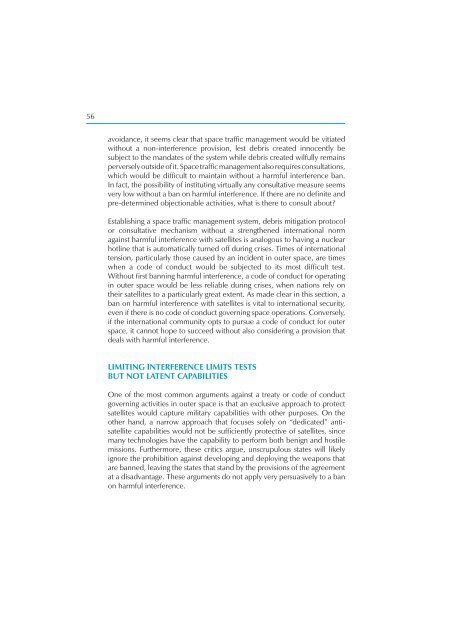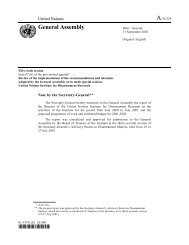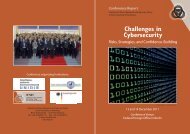Security in Space The Next Generation - UNIDIR
Security in Space The Next Generation - UNIDIR
Security in Space The Next Generation - UNIDIR
You also want an ePaper? Increase the reach of your titles
YUMPU automatically turns print PDFs into web optimized ePapers that Google loves.
56<br />
avoidance, it seems clear that space traffi c management would be vitiated<br />
without a non-<strong>in</strong>terference provision, lest debris created <strong>in</strong>nocently be<br />
subject to the mandates of the system while debris created wilfully rema<strong>in</strong>s<br />
perversely outside of it. <strong>Space</strong> traffi c management also requires consultations,<br />
which would be diffi cult to ma<strong>in</strong>ta<strong>in</strong> without a harmful <strong>in</strong>terference ban.<br />
In fact, the possibility of <strong>in</strong>stitut<strong>in</strong>g virtually any consultative measure seems<br />
very low without a ban on harmful <strong>in</strong>terference. If there are no defi nite and<br />
pre-determ<strong>in</strong>ed objectionable activities, what is there to consult about?<br />
Establish<strong>in</strong>g a space traffi c management system, debris mitigation protocol<br />
or consultative mechanism without a strengthened <strong>in</strong>ternational norm<br />
aga<strong>in</strong>st harmful <strong>in</strong>terference with satellites is analogous to hav<strong>in</strong>g a nuclear<br />
hotl<strong>in</strong>e that is automatically turned off dur<strong>in</strong>g crises. Times of <strong>in</strong>ternational<br />
tension, particularly those caused by an <strong>in</strong>cident <strong>in</strong> outer space, are times<br />
when a code of conduct would be subjected to its most diffi cult test.<br />
Without fi rst bann<strong>in</strong>g harmful <strong>in</strong>terference, a code of conduct for operat<strong>in</strong>g<br />
<strong>in</strong> outer space would be less reliable dur<strong>in</strong>g crises, when nations rely on<br />
their satellites to a particularly great extent. As made clear <strong>in</strong> this section, a<br />
ban on harmful <strong>in</strong>terference with satellites is vital to <strong>in</strong>ternational security,<br />
even if there is no code of conduct govern<strong>in</strong>g space operations. Conversely,<br />
if the <strong>in</strong>ternational community opts to pursue a code of conduct for outer<br />
space, it cannot hope to succeed without also consider<strong>in</strong>g a provision that<br />
deals with harmful <strong>in</strong>terference.<br />
LIMITING INTERFERENCE LIMITS TESTS<br />
BUT NOT LATENT CAPABILITIES<br />
One of the most common arguments aga<strong>in</strong>st a treaty or code of conduct<br />
govern<strong>in</strong>g activities <strong>in</strong> outer space is that an exclusive approach to protect<br />
satellites would capture military capabilities with other purposes. On the<br />
other hand, a narrow approach that focuses solely on “dedicated” antisatellite<br />
capabilities would not be suffi ciently protective of satellites, s<strong>in</strong>ce<br />
many technologies have the capability to perform both benign and hostile<br />
missions. Furthermore, these critics argue, unscrupulous states will likely<br />
ignore the prohibition aga<strong>in</strong>st develop<strong>in</strong>g and deploy<strong>in</strong>g the weapons that<br />
are banned, leav<strong>in</strong>g the states that stand by the provisions of the agreement<br />
at a disadvantage. <strong>The</strong>se arguments do not apply very persuasively to a ban<br />
on harmful <strong>in</strong>terference.








